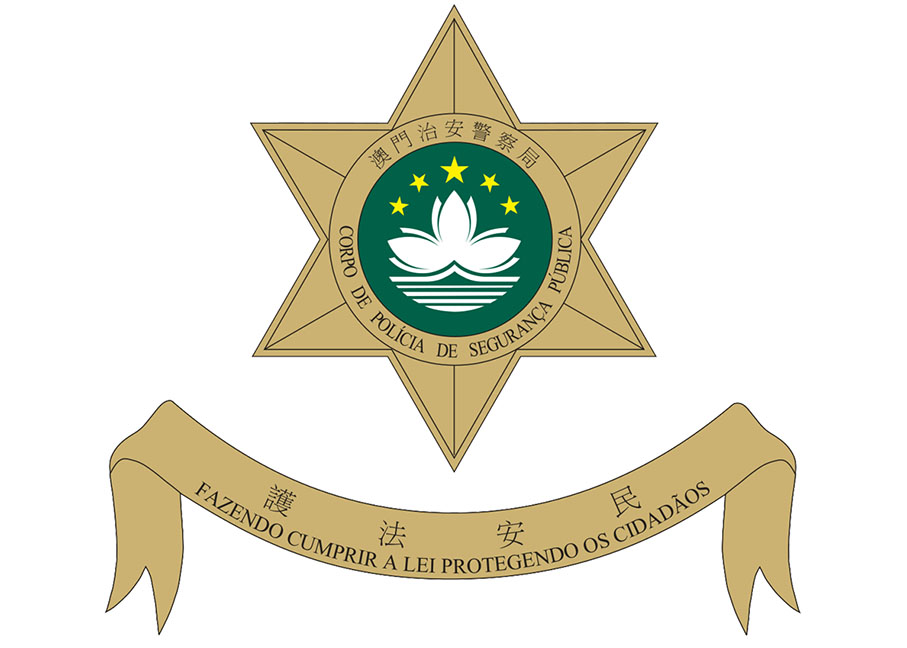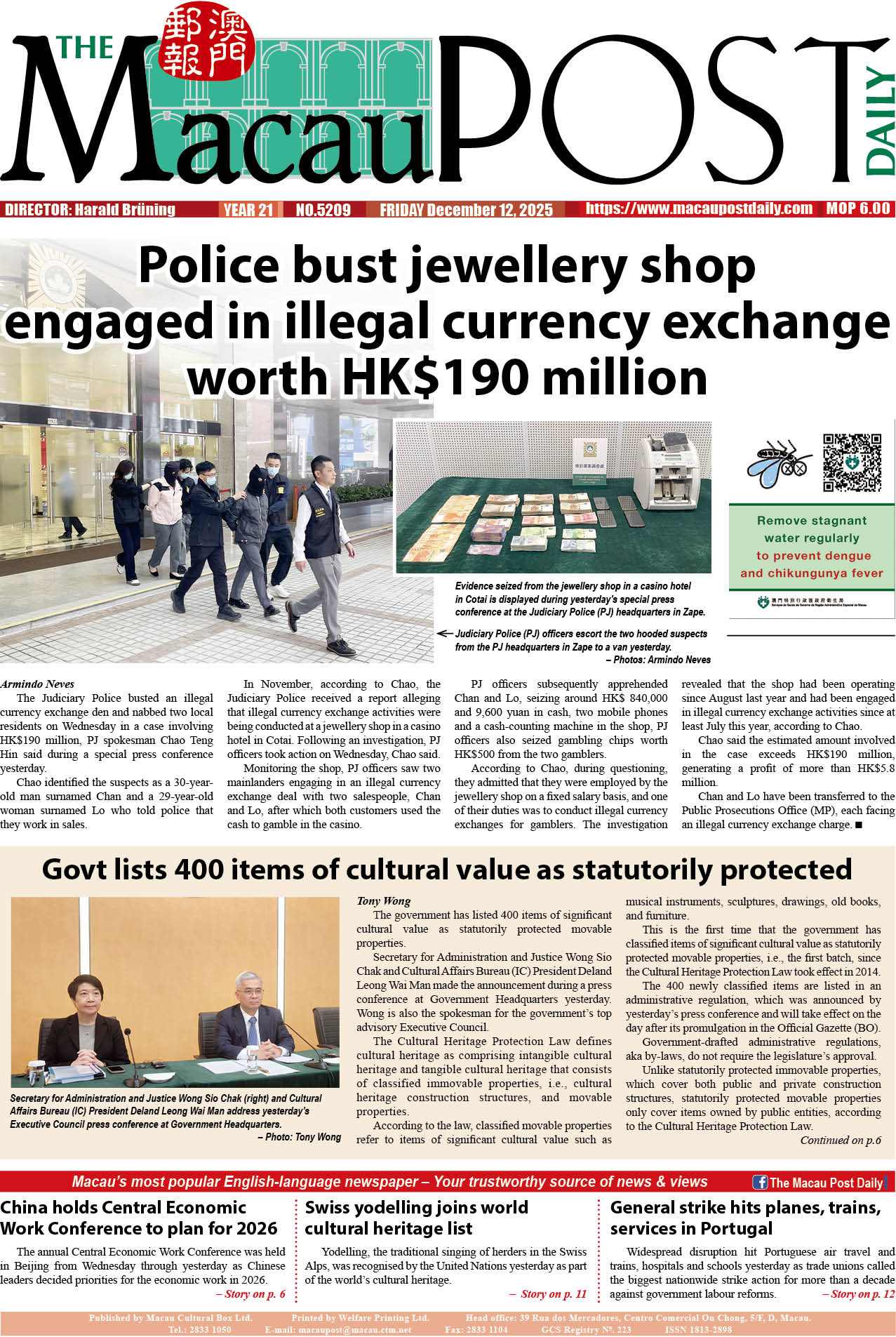Proposes to criminalise incitement to casting blank or invalid votes
The Macau government yesterday launched a public consultation on proposed amendments to the Chief Executive Election Law and the Legislative Assembly Election Law, which aim to ensure the full implementation of the “patriots governing Macau” principle as well as to enable the Macau Special Administrative Region (MSAR) to tackle all the new requirements and challenges for safeguarding national security.
The local government is proposing that its Committee for Safeguarding National Security of the MSAR will be tasked with assessing whether chief executive election candidates uphold the MSAR Basic Law and bear allegiance to the People’s Republic of China (PRC) and the MSAR, and whether legislative election candidates uphold the MSAR Basic Law and bear allegiance to the MSAR.
In addition, the local government is also proposing to criminalise those who publicly incite others to cast blank or invalid votes, or to abstain from voting, in the chief executive or legislative elections.
The MSAR chief executive election is held every five years. The head of the MSAR is elected by a 400-member committee.
The MSAR Legislative Assembly election, which takes place every four years, comprises direct and indirect elections. The current legislature has 33 members, comprising 14 deputies directly elected by universal suffrage, 12 deputies indirectly elected by registered association representatives and seven deputies appointed by the chief executive.
A press conference hosted by Secretary for Administration and Justice André Cheong Weng Chon about the local government’s proposed amendments to the two election laws and its public consultation process was held yesterday morning at a Legal Affairs Bureau (DSAJ) office in Nape.
The public consultation, which started yesterday, will last 45 days. Two sessions for members of the general public, and six sessions for representatives from different segments and sectors of civil society, will be held during the consultation period, which will end on July 29.
Yesterday’s press conference, which lasted an hour, was also attended by several officials under Cheong’s portfolio.
CE election law changes
The public consultation document notes that while the current version of the Chief Executive Election Law stipulates that a chief executive election candidate must uphold the MSAR Basic Law and bear allegiance to the PRC and the MSAR, it does not require the candidate to sign a declaration confirming so.
The consultation document proposes to require chief executive election candidates to sign a declaration confirming that they uphold the MSAR Basic Law and bear allegiance to the PRC and the MSAR.
In addition, the consultation document proposes that when the Chief Executive Electoral Affairs Commission (CAECE) is assessing chief executive election candidates’ qualifications, it will be required to ask the Committee for Safeguarding National Security of the MSAR to assess whether the candidates uphold the MSAR Basic Law and bear allegiance to the PRC and the MSAR.
The consultation document proposes that after the CAECE decides to disqualify a chief executive election candidate after the Committee for Safeguarding National Security of the MSAR has concluded that he or she does not uphold the MSAR Basic Law or is disloyal to the PRC or the MSAR, the respective candidate cannot appeal to the CAECE or the courts against the decision.
The majority of the 400-member committee that elects the chief executive, officially known as the Chief Executive Election Committee, are elected by registered association representatives.
Every five years, the election of the Chief Executive Election Committee is held a few months before the chief executive election.
The consultation document proposes that members of the Chief Executive Election Committee will also be required to uphold the MSAR Basic Law and bear allegiance to the MSAR, as well as to sign a declaration confirming so.
According to the consultation document, the government also proposes that the Committee for Safeguarding National Security of the MSAR will also be tasked with assessing whether candidates of the election of the Chief Executive Election Committee uphold the MSAR Basic Law and bear allegiance to the MSAR.
Legislative election law changes
The consultation document notes that the current version of the Legislative Assembly Election Law, which was amended in 2016, already requires legislative election candidates to sign a declaration confirming that they uphold the MSAR Basic Law and bear allegiance to the MSAR.
The consultation document also notes that according to the Legislative Assembly Election Law’s current version, those who refuse to declare that they uphold the MSAR Basic Law and bear allegiance to the MSAR are ineligible to stand in the direct or indirect legislative elections. In addition, according to the law, residents are also ineligible to run in the direct or indirect legislative elections if “facts have proved” that they do not uphold the MSAR Basic Law or are disloyal to the MSAR.
Similarly, the consultation document proposes that when the Legislative Assembly Electoral Affairs Commission (CAEAL) is assessing legislative election candidates’ qualifications, it will be required to ask the Committee for Safeguarding National Security of the MSAR to assess whether the candidates uphold the MSAR Basic Law and bear allegiance to the MSAR.
Similarly, the consultation document proposes that after CAEAL decides to disqualify a legislative election candidate after the Committee for Safeguarding National Security of the MSAR has concluded that he or she does not uphold the MSAR Basic Law or is disloyal to the MSAR, the respective candidate cannot appeal to the CAEAL or the courts against the decision.
According to the consultation document, the government proposes to criminalise those who publicly incite others to cast blank or invalid votes, or not to cast their ballots, in the chief executive election or legislative election, because such behaviours would “undermine the order, fairness and impartiality” of the elections.
Furthermore, the consultation document proposes that after the CAECE decides to disqualify a chief executive election candidate or the CAEAL decides to disqualify a legislative election candidate, he or she will stay ineligible to be a candidate for a certain period of time.
During yesterday’s press conference, Cheong said that the consultation document does not propose the length of the time because the government will be open to listening to public opinion on the matter during the ongoing consultation process.
Cheong noted that according to Hong Kong’s respective election laws, those who have been disqualified as a candidate will stay ineligible to run in the elections for five years, adding that the Macau government would consider the five-year length adopted in Hong Kong.
Secretary for Administration and Justice André Cheong Weng Chon addresses yesterday’s press conference at a Legal Affairs Bureau (DSAJ) office in Nape about the government’s public consultation on its amendments to the chief executive election and legislative election laws. – Photo: Tony Wong








